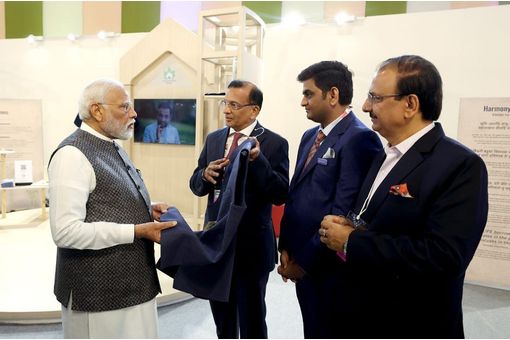Interviews
USTR's NTE 2019 identifies key barriers to digital trade
24 Apr '19
5 min read

Restrictions on cross-border data flows and data localisation requirements by India and China; cloud computing, web filtering and blocking of websites by China; and digital services taxes in the European Union (EU) region are some of the key barriers to digital trade identified in the 2019 National Trade Estimate (NTE) by the Office of the US Trade Representative (USTR).
The barriers identified also include data localisation requirements of Indonesia, Vietnam, Turkey, Russia, Saudi Arabia, Nigeria; Indonesia’s Indonesia’s barriers to Internet services and tariffs on digital products; and Vietnam’s restrictions on online advertising.
China’s Cybersecurity Law and a range of related implementing regulations would prohibit or severely restrict routine cross-border transfers of information, including a broad range of information falling into the undefined category of being ‘important’. The law also imposes data localisation requirements on companies, including those that operate ‘critical information infrastructure’.
China prohibits foreign companies from directly providing cloud computing services to customers in China, requiring foreign service suppliers to partner with a Chinese company and to turn over to that partner their technology, intellectual property, know-how, and brands to enter the market.
China continues to engage in extensive blocking of legitimate websites. China currently blocks 10 of the top 30 global sites and over 10,000 domains in total, affecting billions of dollars in potential US business.
In 2018, India published a number of measures that restrict the cross-border flow of data and create onerous data localisation requirements. In October, one such measure was implemented, requiring payment service suppliers to store all information related to electronic payments by Indian citizens within India.
Much broader restrictions included in India’s draft Personal Data Protection law and draft e-commerce policy threaten to undermine the digital economy as a major source of growth for India, the USTR feels.
In 2018, the European Commission proposed a directive to levy an interim tax on revenues from digital services, including advertising, online marketplaces, and data services, on large companies, including those without a physical presence in the EU. EU member states, including France, the United Kingdom, Italy, Spain and Austria, are currently considering similar proposals.
The United States opposes proposals that single out digital services for tax purposes, according to a recent USTR factsheet. In addition, to the extent these proposals apply almost exclusively to US companies, they raise further concerns of a discriminatory effect on US suppliers participating in EU markets.
Indonesia requires providers of a ‘public service’ to establish local data centres and disaster recovery centres in the country, and has proposed substantially expanding the categories of data subject to localisation. Other regulations require local storage and processing of certain personal data and financial data.
Indonesia is considering multiple new regulations that would require foreign providers of Internet services including online intermediaries, e-commerce companies and ‘digital platform services’ suppliers to register with the government, designate permanent local representatives, and prioritize local goods and services.
In 2018, Indonesia issued a new regulation establishing tariff lines for digital products transmitted electronically, such as software, apps, video and music. Although tariffs are currently set at zero, imposing duties on digital products would raise concerns regarding Indonesia’s longstanding commitment to the World Trade Organisation (WTO)—renewed on a multilateral basis in December 2017—not to impose duties on electronic transmissions.
Similarly, customs reporting requirements in Indonesia, even in the absence of a duty, would be highly disruptive of existing trade, according to the USTR.
A draft data protection law in Kenya would require the local storage of personal data, prohibit the cross-border processing of certain ‘sensitive personal data’, and place unduly strict conditions on the transfer of personal data outside Kenya. Such restrictions will hamper the development of Kenya’s digital economy, and may undermine data security without providing any meaningful benefit to data privacy, USTR feels.
Nigeria requires businesses to store all data concerning Nigerian citizens within the country. It also requires businesses to host all government data locally unless officially exempted. In practice, these requirements disproportionately affect foreign businesses, which distribute their data storage and processing globally, said USTR.
Russian law requires that certain data on Russian citizens collected electronically by companies be processed and stored within the country. US-based services have been blocked for failure to comply with this law, including numerous Internet protocol addresses associated with US cloud service providers in 2018.
Many US companies face a choice between withdrawing from the Russian market and operating under significant legal uncertainty.
Turkey maintains multiple data localisation requirements in various laws and regulations, including limitations on transfers of personal data abroad, requirements that suppliers of electronic payment services maintain information systems within Turkey, and a new 2018 requirement that publicly traded companies keep their primary and secondary information systems and data in the country.
Vietnam requires advertisers to contract with a local services supplier as a condition of placing advertisements on foreign websites targeting the country. This requirement is burdensome and impractical, given that the online advertising market typically functions through automated, real-time auctions for advertising space, feels USTR.
In 2018, Vietnam passed a law on cybersecurity that requires online service suppliers to store data and establish a local presence in the country.
Vietnam is currently considering implementing regulations that narrow the applicability of such requirements and apply them only after a company fails to comply with specific provisions of the law. However, the requirements would still apply to a range of digital services and, as such, remain problematic, the USTR factsheet added.
In 1998, WTO members first addressed digital issues, agreeing to prohibit customs duties on electronic transmissions. But barriers to digital trade threaten the ability of all firms–including small businesses–to benefit from the advantages of the digital economy, feels USTR. (DS)
The barriers identified also include data localisation requirements of Indonesia, Vietnam, Turkey, Russia, Saudi Arabia, Nigeria; Indonesia’s Indonesia’s barriers to Internet services and tariffs on digital products; and Vietnam’s restrictions on online advertising.
China’s Cybersecurity Law and a range of related implementing regulations would prohibit or severely restrict routine cross-border transfers of information, including a broad range of information falling into the undefined category of being ‘important’. The law also imposes data localisation requirements on companies, including those that operate ‘critical information infrastructure’.
China prohibits foreign companies from directly providing cloud computing services to customers in China, requiring foreign service suppliers to partner with a Chinese company and to turn over to that partner their technology, intellectual property, know-how, and brands to enter the market.
China continues to engage in extensive blocking of legitimate websites. China currently blocks 10 of the top 30 global sites and over 10,000 domains in total, affecting billions of dollars in potential US business.
In 2018, India published a number of measures that restrict the cross-border flow of data and create onerous data localisation requirements. In October, one such measure was implemented, requiring payment service suppliers to store all information related to electronic payments by Indian citizens within India.
Much broader restrictions included in India’s draft Personal Data Protection law and draft e-commerce policy threaten to undermine the digital economy as a major source of growth for India, the USTR feels.
In 2018, the European Commission proposed a directive to levy an interim tax on revenues from digital services, including advertising, online marketplaces, and data services, on large companies, including those without a physical presence in the EU. EU member states, including France, the United Kingdom, Italy, Spain and Austria, are currently considering similar proposals.
The United States opposes proposals that single out digital services for tax purposes, according to a recent USTR factsheet. In addition, to the extent these proposals apply almost exclusively to US companies, they raise further concerns of a discriminatory effect on US suppliers participating in EU markets.
Indonesia requires providers of a ‘public service’ to establish local data centres and disaster recovery centres in the country, and has proposed substantially expanding the categories of data subject to localisation. Other regulations require local storage and processing of certain personal data and financial data.
Indonesia is considering multiple new regulations that would require foreign providers of Internet services including online intermediaries, e-commerce companies and ‘digital platform services’ suppliers to register with the government, designate permanent local representatives, and prioritize local goods and services.
In 2018, Indonesia issued a new regulation establishing tariff lines for digital products transmitted electronically, such as software, apps, video and music. Although tariffs are currently set at zero, imposing duties on digital products would raise concerns regarding Indonesia’s longstanding commitment to the World Trade Organisation (WTO)—renewed on a multilateral basis in December 2017—not to impose duties on electronic transmissions.
Similarly, customs reporting requirements in Indonesia, even in the absence of a duty, would be highly disruptive of existing trade, according to the USTR.
A draft data protection law in Kenya would require the local storage of personal data, prohibit the cross-border processing of certain ‘sensitive personal data’, and place unduly strict conditions on the transfer of personal data outside Kenya. Such restrictions will hamper the development of Kenya’s digital economy, and may undermine data security without providing any meaningful benefit to data privacy, USTR feels.
Nigeria requires businesses to store all data concerning Nigerian citizens within the country. It also requires businesses to host all government data locally unless officially exempted. In practice, these requirements disproportionately affect foreign businesses, which distribute their data storage and processing globally, said USTR.
Russian law requires that certain data on Russian citizens collected electronically by companies be processed and stored within the country. US-based services have been blocked for failure to comply with this law, including numerous Internet protocol addresses associated with US cloud service providers in 2018.
Many US companies face a choice between withdrawing from the Russian market and operating under significant legal uncertainty.
Turkey maintains multiple data localisation requirements in various laws and regulations, including limitations on transfers of personal data abroad, requirements that suppliers of electronic payment services maintain information systems within Turkey, and a new 2018 requirement that publicly traded companies keep their primary and secondary information systems and data in the country.
Vietnam requires advertisers to contract with a local services supplier as a condition of placing advertisements on foreign websites targeting the country. This requirement is burdensome and impractical, given that the online advertising market typically functions through automated, real-time auctions for advertising space, feels USTR.
In 2018, Vietnam passed a law on cybersecurity that requires online service suppliers to store data and establish a local presence in the country.
Vietnam is currently considering implementing regulations that narrow the applicability of such requirements and apply them only after a company fails to comply with specific provisions of the law. However, the requirements would still apply to a range of digital services and, as such, remain problematic, the USTR factsheet added.
In 1998, WTO members first addressed digital issues, agreeing to prohibit customs duties on electronic transmissions. But barriers to digital trade threaten the ability of all firms–including small businesses–to benefit from the advantages of the digital economy, feels USTR. (DS)
Fibre2Fashion News Desk – India
Popular News
Leave your Comments
Editor’s Pick
































-Ltd..jpg?tr=w-120,h-60,c-at_max,cm-pad_resize,bg-ffffff)





.jpg?tr=w-120,h-60,c-at_max,cm-pad_resize,bg-ffffff)
.jpg?tr=w-120,h-60,c-at_max,cm-pad_resize,bg-ffffff)






